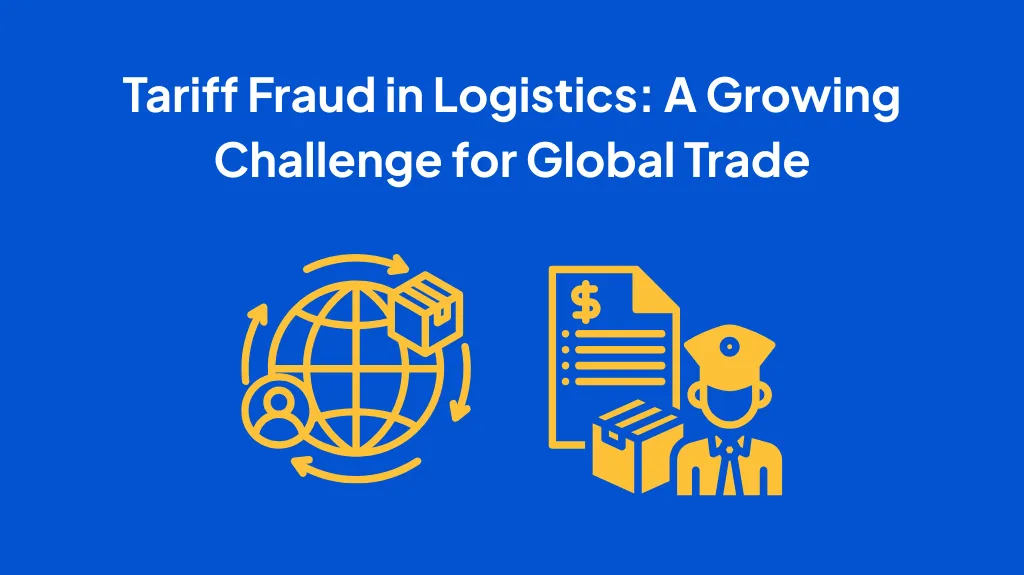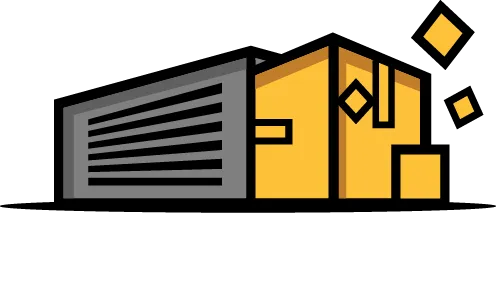Quick Jump
Tariff fraud in logistics is a growing threat to global supply chains. This type of fraud happens when importers and exporters give false information to avoid paying the correct duty rates on imported goods. It violates international trade regulations and can cause big problems for everyone involved—including logistics providers.
Recent cases have shown many examples of customs fraud, like false invoicing in trade, misreporting the country of origin, and incorrect product codes. As a result, agencies like Customs and Border Protection (CBP) are stepping up enforcement. They’re asking logistics providers to do more to make sure every shipment ensures compliance with trade laws.
If you're moving goods across borders, strong compliance programs, clear internal controls, and proper due diligence are now critical to protect your business.
What is Tariff Fraud in Logistics?
Tariff fraud in logistics means cheating the customs system to pay lower taxes. This is a form of customs fraud and is illegal. It involves giving wrong or incomplete information about goods imported into a country.
Common Types of Tariff Fraud:
Tariff classification manipulation – using the wrong product codes (HS codes) to lower the tax on imported products.
- Undervaluation – claiming the goods are worth less than they really are.
- False country-of-origin claims – lying about where the goods were made to avoid trade penalties or get benefits from trade deals.
- Transshipment – moving goods through another country to hide their real origin.
- False invoicing in trade – using fake invoices that don’t match what was actually shipped.
Real-World Examples
A company might say it is importing rubber sandals when it’s really shipping luxury leather shoes—just to pay a lower duty rate. Another might route Chinese-made electronics through Malaysia and falsely say they were made there. These actions violate the False Claims Act (FCA) and may even count as a reverse false claim if the goal is to avoid paying the federal government what’s owed.
Why Tariff Fraud is on the Rise
There are a few reasons more companies are trying to cheat the system today.
More Complex Tariffs and Trade Rules
The U.S.-China trade war and Brexit made international trade regulations harder to follow. New tariffs mean businesses pay more on certain imported products, which gives some people a reason to commit customs fraud.
Economic Pressure
With shipping, labor, and fuel costs rising, companies are looking for ways to cut costs. Some think committing import/export fraud or changing invoice details is an easy fix. But this puts them and their logistics partners at legal and financial risk.
Weak Enforcement in Some Areas
Some countries still don’t have strong customs systems. That means fraud, like misdeclaring the country of origin or submitting false paperwork, can go unnoticed. That’s why CBP is now asking logistics companies to improve risk management and look for red flags in client paperwork.
Trade Enforcement News: Recent Cases (2024–2025)
Recent trade enforcement news shows that Border Protection CBP, along with other agencies, is cracking down on tariff fraud in logistics.
Case 1: Apparel Misclassification
In 2024, a U.S. company was fined \$12 million after CBP found they were claiming fashion garments were industrial fabric. This is a clear case of tariff classification manipulation. The company’s internal records—and lack of proper compliance programs—helped prove the fraud.
Case 2: Electronics Origin Fraud
In 2025, a tech company sent Chinese parts through Vietnam and labeled them “Made in Vietnam.” This let them avoid U.S. tariffs. Investigators found fake invoices and shipping labels—classic signs of false invoicing in trade and customs fraud.
Case 3: Furniture Undervaluation in the EU
The European Union found that some companies in Germany and the Netherlands were declaring high-end Turkish furniture as low-cost items. The fraud involved over €40 million in unpaid taxes and is now part of a joint investigation with the federal government.
These cases show that importers and exporters who don’t follow the rules can face big fines and even criminal charges.
The Impact on Logistics Providers
Even if the logistics company didn’t commit fraud, they can still face problems if their client did.
A. Shipment Delays
If Customs and Border Protection flags a shipment, it might be held for days or weeks. This causes delivery problems, storage fees, and frustrated customers.
B. Reputational Risk
Being tied to a client who commits customs fraud can damage your brand—even if you didn’t know about it. In a competitive market, trust is hard to earn and easy to lose.
C. Increased Scrutiny and Responsibilities
Authorities now expect logistics firms to help ensure compliance. That includes reviewing documents and spotting red flags like incorrect HS codes, fake values, or mismatched shipping labels.
This means logistics providers must now act more like a customs broker, helping clients avoid mistakes—and helping themselves avoid penalties.
How Governments Are Responding
Governments around the world are taking steps to stop tariff fraud in logistics.
A. U.S. Customs and Border Protection
Border Protection CBP now uses AI to check documents for signs of false invoicing in trade, value mismatches, or improper codes. They also started a tip line in 2025, where people can report fraud anonymously. The agency is also working closely with logistics providers and customs brokers to improve enforcement.
B. EU Enforcement
The EU has made its systems faster and smarter. Customs officers across Europe now share real-time data. The focus is on products at high risk of import/export fraud, like furniture, clothing, and electronics.
C. Technology and Traceability
New tools like blockchain are helping customs track the full journey of imported goods. This makes it harder to hide the true country of origin or change details after shipment. AI systems can also flag red flags and improve risk management before the goods reach inspection points.
How Logistics Companies Can Protect Their Business
Here’s what logistics companies can do to reduce their risk and build stronger compliance programs:
A. Educate Your Team
Make sure your staff knows how tariff fraud in logistics works. Train them to spot signs of customs fraud, such as odd invoice amounts, mismatched descriptions, or sudden changes in shipping routes.
B. Verify All Documents
Check all documents—including invoices, packing lists, and certificates of origin. Make sure product codes and values are accurate and match the shipment. This is part of good internal controls.
C. Use Compliance Tools
Software tools like Descartes or ONESOURCE can help check HS codes, track tariffs, and alert your team to possible issues. These systems also keep you up to date with changing international trade regulations.
D. Perform Due Diligence on Clients
Before working with a new client, check their history. Look for signs like frequent changes in paperwork, odd routing, or invoices that don’t match the cargo. This type of due diligence helps stop problems before they start.
Strong systems and smart habits help logistics companies protect your business and keep operations running smoothly.
From Risk to Resilience: Your Next Steps
Tariff fraud in logistics continues to rise—and so does the risk of getting caught in it. Whether it’s false invoicing in trade, tariff classification manipulation, or misreporting goods or services, the consequences can be serious.
But there is a path forward. With the right tools, strong compliance programs, and smart risk management, you can stay ahead. Train your team. Verify your shipments. Watch for red flags. And partner with service providers who care as much about compliance as you do.
At Fulfill.com, we match businesses with trusted 3PLs who understand the importance of Customs and Border Protection requirements, import/export regulations, and ethical shipping practices. Every 3PL in our network is vetted to help you avoid risk, improve efficiency, and protect your business.
Ready to Strengthen Your Supply Chain Compliance?
Our vetted 3PL network helps you stay competitive while meeting the highest standards in trade regulations and documentation accuracy.










